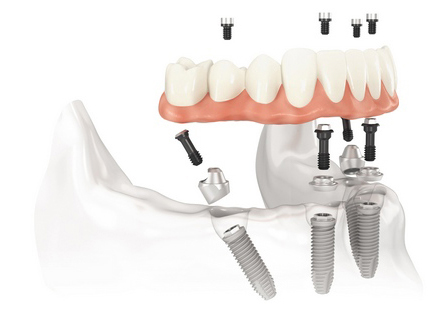Q&A With Dr Emma
Dr Emma, I will soon need a 4 on 4 teeth implant procedure on my upper teeth and then a full 4 on 4 teeth implant on my lower teeth. Is it best to have both upper and lower implants at the same time? What issues will I encounter with full teeth implants - in particular will food find its way under the implants? Thanks Peter from East Fremantle, WA.
 Dear Peter,
Dear Peter,
I think you might mean "All-on-4", which is a technique of placing four implants in both the upper and lower jaw which have no remaining teeth, to then fit prosthetic teeth in the form of a bridge or denture.
It might surprise you to know, that back in my day at least, there was very limited training in the field of implant dentistry within the undergraduate dental degree. I think my class endured the same "introduction to implants" lecture at least four times in our five year course, but that was as complex as it got.
So, any dentist who is placing implants has either completed additional training, or is a specialist dentist such as a prosthodontist or periodontist. As such, my own understanding of the intricacies of placing and restoring implants is limited to the basics. I don't do implants myself as I haven't undertaken any additional training to do so. When implants are the best option for one of my patients, I refer them on to a colleague or specialist who is more qualified in that area.
What I can tell you is that implants are like any other dental procedure, and are dependent on so many different individual things that it's impossible for me to advise you on what is best for you without knowing more about your particular case, (and implants in general!). Are you having a general anaesthetic or sedation for the implant surgery? That's something to consider, because sedation is not risk free and generally the fewer times you are put under, the better. However, there may be clinical circumstances in your mouth and jaws which mean treatment of the upper and lower jaws separately makes more sense or carries less risk. The best person to advise you on this is the practitioner carrying it out.
You will still need regular check-ups with your dentist or specialist to make sure your prostheses and implants are in good working order. Plaque and food can still accumulate and will need to be cleaned off, and the implants themselves need to be checked for peri-implantitis, (the implant version of "gum disease").
In general though, a successful implant + prosthesis will be worlds better than a removable denture, and certainly a lot better than no teeth at all!
Thanks,